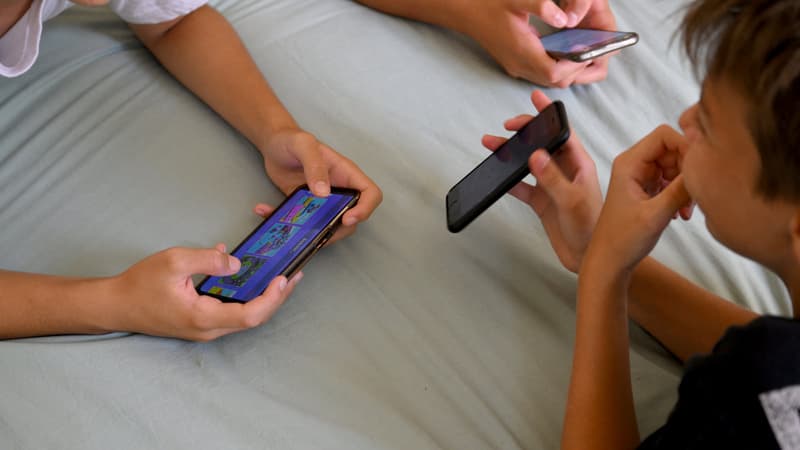Marine* “couldn’t help it.” Although she was “hurt” to see her posts, the 24-year-old business school student spied on her ex-boyfriend on social media after her breakup. “The problem of lurkingit is that we seek at all costs to find something and what we find is never good”, he comments today.
For several weeks, once a day, the young woman consulted her former partner’s Instagram account, in which he posted photos and stories, in particular of his vacations with his new girlfriend, smiling, happy.
Then the young man blocked her. “So I created a fake account so I could continue,” Marine admits. “It was so easy.” Eventually, her ex-boyfriend made her account private and she definitely no longer has access to it.
One in three French “stalks”
Marine is not the only one who has “stalked”, or tracked, watched, in French, one of her relatives. According to a survey by Harris Poll for NortonLifeLock published last February, more than a third of French men and women who have already been in a relationship admit to having seen their partner or ex-partner without their knowledge. And like Marine, about 8% of them have already created a fake account.
“We do not stalk by chance,” observes for BFMTV.com Catherine Lejealle, professor-researcher at ISC Paris who participated in this study. “This often happens in a relationship marked by fascination.” It can point to the ex, like her new boyfriend or girlfriend, onto whom we can’t help but project supposed qualities.
“He is a person we fantasize about and for whom we can also harbor hatred,” adds Catherine Lejealle, author of Behind the scenes of dating, all about online dating.
A gesture that has become “banal”?
The practice is made easier as “social networks drive comparison,” says psychologist and psychoanalyst Michael Stora, co-founder of the Observatory of Digital Worlds in the Human Sciences, for BFMTV.com. “The other gives you crumbs to nibble on,” leaving behind many fingerprints, says sociologist Catherine Lejealle.
This is even the beginning of these sites, consider for BFMTV.com Sophie Jehel, professor of information and communication sciences at the University of Paris 8:
consequence: the lurking normalizes For example, geolocation has become essential in many places, not only in social networks. And some messengers specify that this user is or was connected so many minutes ago. “Following a person you like or on the contrary you don’t like becomes a banal gesture”, estimates Sophie Jehel, author of Adolescence at the heart of the digital economy.
“He’s a bit of a masochist”
Nathalie*, a 46-year-old teacher, regularly checks the Facebook page of one of her acquaintances. A friend of friends whom she has seen several times in the past but whom she no longer hangs out with. “I don’t even talk to her on the networks,” she explains to BFMTV.com. And yet, she diligently follows her posts.
A person “very connected to well-being”, explains Nathalie, organizing “reconnection with her divine self” courses with cocoa ceremonies and “anchor dances”. “It’s a great delirium,” judges Nathalie. “Every time she posts something, I freak out so much it’s silly.” And yet, she can’t help but go to see these posts, even if she consistently disapproves of them.
Wait for “the misstep”
Or is it about lurking or of schadenfriending – contraction of the German word “schadenfreude” (“unhealthy joy”) and the English “friend” (“friend”), which means to monitor or spy on some of your contacts in a non-benevolent approach – the practice is quite common, abounds the sociologist of digital uses Olivier Glassey, professor and researcher at the University of Lausanne.
“It’s a digital link, a kind of ghostly presence, a continuum that allows you to have someone you don’t like, envy or envy and don’t love at a distance. Not necessarily good, ”she analyzes.
Like a childhood friend, a colleague, a neighbor, or even a family member. “You can play very well at all levels of social relationships,” says Olivier Glassey, a specialist in digital collective dynamics. An unpleasant, even hostile, vigilance, which is equivalent to waiting for “the false step”.
The “toxic” dimension of social networks
An oscillation between admiration, envy and jealousy, at the risk of falling into obsession. “This can lead to a way of devouring the other and going very far,” warns Michael Stora, author of (a) Social networks: discover the dark side of algorithms.
The psychologist and psychoanalyst evokes the case of one of his patients who did not recover from her breakup. She had the passwords of her ex-spouse and inspected all of her digital accounts and exchanges, which is illegal. Various crimes can be retained, such as fraudulent access to an automated data processing system, invasion of privacy or secrecy of correspondence.
the lurking It can also go on to very real and criminally reprehensible harassment, defined as the fact of “making comments or having repeated behaviors that have the purpose or effect of degrading the victim’s living conditions,” specifies the Public Service site. Even online, whether the exchanges are public (like on forums) or private. A crime punishable by two years in prison and a fine of 30,000 euros.
For Michael Stora, this surveillance is not new: “It’s gossip, voyeurism, the idea that we can pierce each other’s potential secrets.” But social networks have amplified it, giving it unprecedented effectiveness. And as the sociologist Olivier Glassey concludes: “Each one, if he wishes, can become the other’s spy.”
*The witnesses wished to be introduced by their first name only.
Source: BFM TV


